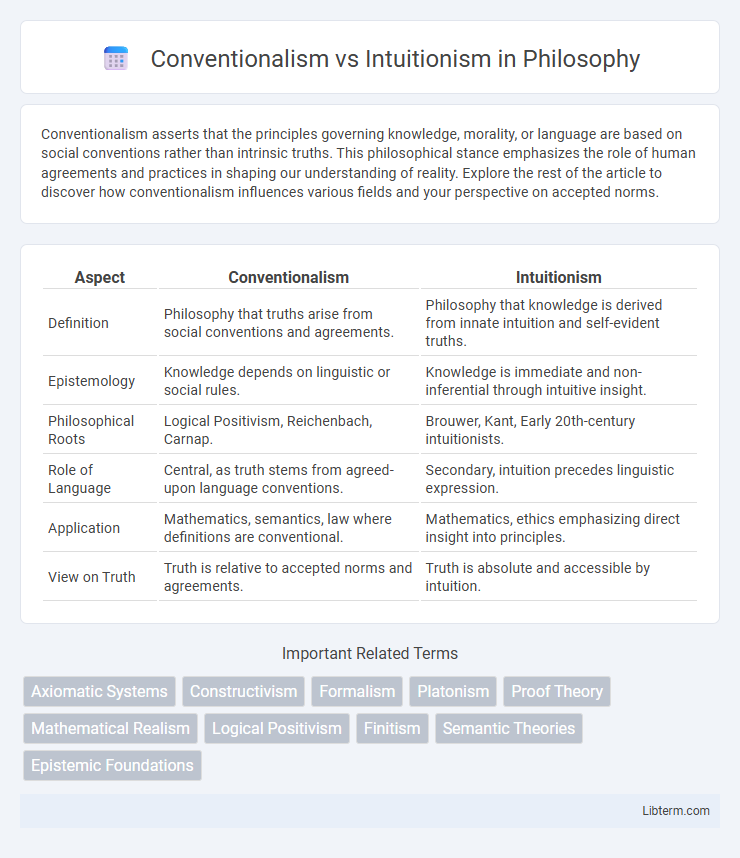Conventionalism asserts that the principles governing knowledge, morality, or language are based on social conventions rather than intrinsic truths. This philosophical stance emphasizes the role of human agreements and practices in shaping our understanding of reality. Explore the rest of the article to discover how conventionalism influences various fields and your perspective on accepted norms.
Table of Comparison
| Aspect | Conventionalism | Intuitionism |
|---|---|---|
| Definition | Philosophy that truths arise from social conventions and agreements. | Philosophy that knowledge is derived from innate intuition and self-evident truths. |
| Epistemology | Knowledge depends on linguistic or social rules. | Knowledge is immediate and non-inferential through intuitive insight. |
| Philosophical Roots | Logical Positivism, Reichenbach, Carnap. | Brouwer, Kant, Early 20th-century intuitionists. |
| Role of Language | Central, as truth stems from agreed-upon language conventions. | Secondary, intuition precedes linguistic expression. |
| Application | Mathematics, semantics, law where definitions are conventional. | Mathematics, ethics emphasizing direct insight into principles. |
| View on Truth | Truth is relative to accepted norms and agreements. | Truth is absolute and accessible by intuition. |
Introduction to Conventionalism and Intuitionism
Conventionalism in mathematics asserts that mathematical truths are not discovered but established through agreed-upon conventions, emphasizing the role of language and rules in defining mathematical systems. Intuitionism, founded by L.E.J. Brouwer, posits that mathematics is a creation of the human mind grounded in intuitive construction rather than external truths, rejecting the law of excluded middle in logic. Both philosophies challenge classical foundations but differ fundamentally in their views on the nature and origin of mathematical knowledge.
Historical Background of Mathematical Philosophy
Conventionalism emerged prominently in the early 20th century, led by philosophers such as Henri Poincare, who argued that mathematical truths are not discovered but established by agreed-upon conventions. Intuitionism, founded by L.E.J. Brouwer around the same period, asserted that mathematics is a creation of the human mind based on intuitive mental constructions rather than external realities. These competing schools shaped the foundational debates in mathematical philosophy by contrasting the roles of human cognition and formal agreements in the nature of mathematical knowledge.
Key Principles of Conventionalism
Conventionalism asserts that the foundations of mathematics are based on agreed-upon rules or conventions rather than inherent truths, emphasizing the role of linguistic and symbolic systems in shaping mathematical knowledge. It posits that mathematical statements are true by virtue of the definitions and axioms chosen within a formal system, highlighting the arbitrariness and flexibility of these choices. Key principles include the reliance on human-made conventions to establish mathematical truths and the view that mathematical objects lack independent existence outside these frameworks.
Core Tenets of Intuitionism
Intuitionism asserts that mathematical truths are not discovered but are mental constructions arising from the self-evident intuition of numbers and their properties. It emphasizes the primacy of constructive proof and rejects the law of excluded middle, differentiating it from classical logic. This core tenet positions mathematics as a product of the human mind, grounded in inherent mathematical intuition rather than external conventions.
Differences in Logic and Truth Foundations
Conventionalism asserts that logical principles are based on agreed-upon conventions or linguistic frameworks rather than objective truths, emphasizing that truth depends on these chosen rules. Intuitionism, rooted in mathematical constructivism, holds that logical truths arise from mental constructions and intuitions, rejecting classical logic's law of excluded middle for statements lacking constructive proof. Differences in truth foundations center on conventionalism's reliance on external linguistic agreements versus intuitionism's internal, constructive validation of mathematical and logical propositions.
Major Proponents and Influential Works
Conventionalism, championed by Henri Poincare, emphasizes mathematical truths as conventions or agreements rather than absolute realities, with his influential work *Science and Hypothesis* laying foundational ideas. Intuitionism, led by L.E.J. Brouwer, argues that mathematics is a creation of the human mind grounded in intuition, as detailed in his seminal essay *Intuitionism and Formalism*. Both philosophies shaped modern mathematical logic and philosophy by challenging the objectivity and foundations of mathematical knowledge.
Application in Mathematical Practice
Conventionalism in mathematical practice emphasizes that mathematical truths are established through agreed-upon rules and symbols, facilitating consistent communication and problem-solving frameworks. Intuitionism prioritizes constructive proof methods, demanding explicit construction of mathematical objects for validity, which influences proof techniques and theorems accepted in intuitionistic logic. The application of these philosophies shapes mathematical workflows, with conventionalism fostering axiomatic system development and intuitionism driving algorithmic and constructive approaches in areas like computer science and proof theory.
Criticisms and Controversies
Conventionalism faces criticism for relying heavily on arbitrary linguistic or social conventions, which some argue undermines the objective foundation of mathematical truths and leads to relativism. Intuitionism is controversial due to its rejection of the law of excluded middle and insistence on constructible proofs, causing debates on the validity of classical logic in mathematics. Both philosophies encounter challenges in addressing the applicability of mathematics to the physical world and the universality of mathematical knowledge.
Impact on Modern Mathematics
Conventionalism emphasizes the role of linguistic and symbolic conventions in shaping mathematical truths, influencing the development of formal systems and axiomatic frameworks in modern mathematics. Intuitionism rejects the law of excluded middle and stresses constructive proofs, leading to alternative foundations such as constructive mathematics and computability theory. The impact of both philosophies is evident in contemporary fields like proof theory, algorithmic logic, and the philosophy of mathematics, where formal rigor and constructive methods coexist.
Conclusion: Future Directions and Relevance
Conventionalism and Intuitionism continue to shape philosophical and mathematical debates, emphasizing the role of linguistic structures versus inherent cognitive insights in understanding truth and ethics. Future research is likely to explore hybrid models integrating formal conventions with intuitive knowledge, enhancing applications in logic, ethics, and language theory. This evolving discourse remains crucial for developing robust epistemological frameworks and refining decision-making processes in AI and human-computer interaction.
Conventionalism Infographic

 libterm.com
libterm.com